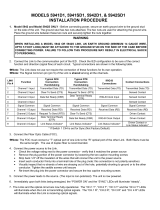
5.3.2.2 Mounting procedure for 19” panel rack mounting................................................................... 22
5.3.3 Wall mounting..................................................................................................................................... 23
5.3.3.1 Overview........................................................................................................................................... 23
5.3.3.2 Mounting procedure for wall mounting..................................................................................... 23
5.3.3.3 How to reach the rear side of the IED.........................................................................................23
5.3.4 Side-by-side 19” rack mounting...................................................................................................... 24
5.3.4.1 Overview........................................................................................................................................... 24
5.3.4.2 Mounting procedure for side-by-side rack mounting............................................................. 25
5.3.4.3 IED mounted with a RHGS6 case................................................................................................. 25
5.3.5 Side-by-side flush mounting............................................................................................................26
5.3.5.1 Overview........................................................................................................................................... 26
5.3.5.2 Mounting procedure for side-by-side flush mounting............................................................ 27
5.3.6 Mounting the injection unit REX060 (REG670 only)....................................................................27
5.3.7 Mounting the coupling capacitor unit REX061 and shunt resistor unit REX062
(REG670 only)......................................................................................................................................28
5.3.7.1 Coupling capacitor unit REX061.................................................................................................. 28
5.3.7.2 Shunt resistor unit REX062...........................................................................................................29
Section 6 Connecting.............................................................................................................. 31
6.1 Making the electrical connection.........................................................................................................31
6.1.1 IED connectors.................................................................................................................................... 31
6.1.1.1 Overview............................................................................................................................................31
6.1.1.2 Front side connectors....................................................................................................................33
6.1.1.3 Rear side connectors......................................................................................................................34
6.1.1.4 Connection examples for high impedance differential protection......................................45
6.1.2 Connecting to protective ground................................................................................................... 47
6.1.3 Connecting the power supply module...........................................................................................47
6.1.4 Connecting to CT and VT circuits................................................................................................... 48
6.1.5 Connecting the binary input and output signals.........................................................................49
6.1.6 Making the shield connection..........................................................................................................51
6.2 Making the electrical connection to the rotor and stator injection equipment (REG670
only)...........................................................................................................................................................53
6.2.1 Connectors for injection unit REX060, coupling capacitor unit REX061 and shunt
resistor unit REX062.......................................................................................................................... 53
6.2.1.1 Injection unit REX060.....................................................................................................................53
6.2.1.2 Coupling capacitor unit REX061.................................................................................................. 55
6.2.1.3 Shunt resistor unit REX062........................................................................................................... 57
6.2.2 Connecting injection unit REX060, coupling capacitor unit REX061 and shunt
resistor unit REX062..........................................................................................................................58
6.2.3 Connecting and setting voltage inputs.........................................................................................63
6.3 Making of Ethernet connections......................................................................................................... 65
6.3.1 Connecting station communication interfaces...........................................................................65
6.3.2 Connecting remote communication interfaces LDCM...............................................................66
6.4 Installing the serial communication cable for RS485......................................................................67
Table of contents
2 670 series
Installation manual





















